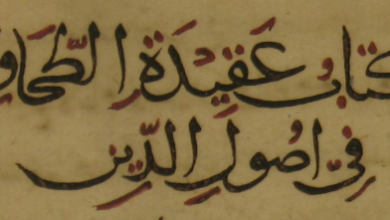The Phrase ‘ bi dhatihi ‘ Explained
Some of the Imams of the past objected to the usage of the phrase bi dhatihi.
For example, regarding the hadith that says “God is between you and your qibla” (إِنَّ رَبَّهُ بَيْنَهُ وَبَيْنَ الْقِبْلَةِ)
Ibn Hajar al-‘Asqalani says that in this is a refutation on those who claim that God is above the throne bi dhatihi (with His Essence).
(فِيهِ الرَّدّ عَلَى مَنْ زَعَمَ أَنَّهُ عَلَى الْعَرْش بِذَاتِهِ)
However, what follows is a translation of the explanation of Shaykh al-Azhari (courtesy of Junaid) which brings further clarity to this issue, insha’Allah:
الذي أذكر أني قلته سابقا أن كلمة (بذاته) لم تثبت عن السلف، وإنما زادها أناس على السلف من كيسهم كما قال الذهبي، وهذه اللفظة لا يحكم على من تلفظ بها بأنه مجسم أو مشبه لمجردها ، لا فهذا لا قائل به، وإنما ينظر فيما قبلها وبعدها من كلامه لأن هذه اللفظة قد يراد بها حق وقد يراد بها باطل:أما الحق ففي كلام من قال مثلا بأن الله كلم موسى عليه السلام بذاته. فهذه اللفظة هنا المقصود منها أن الكلام كان مباشرة بلا واسطة ملك، فيكون نسبة التكلم إلى الله مع موسى على الحقيقة لا المجاز، أما لو فرضنا أن الذي كلمه ملك ثم قلنا كلم الله موسى، لكانت نسبة التكليم مجازية ولما كان كلمه بذاته.انظر مثلا إلى قولنا: فتح عمر بن الخطاب مصر، فهذا مجاز لأنه لم يفتحها بذاته بل أرسل الجند.
What I have mentioned and said before is that the word “bi dhatihi” is not proven from the salaf. People attributed it to the salaf from their own bag as Al-Dhahabi said. The mere utterance of this word does not make one an anthropomorphist or a mushabbih. Rather, one looks to what [is said] before and after his speech because with this expression, one can intend something good and one can intend something false. If it is something good then it is, for example, like one who says that Allah spoke with Musa (peace be upon him) with His essence (bi dhatihi). This expression here implies that the speech was directly without the intermediary of an angel. So the attribution of “speaking” to Allah is literal (haqiqa) and not metaphorical. But when we assume that the angel spoke and then we say that Allah spoke to Musa, the attribution of “speaking” if figurative because Allah did not speak to him with His essence (bi dhatihi). Look for example at our statement: Umar bin al-Khattab conquered Egypt. This is figurative because he did not conquer it himself (bi dhatihi) but rather sent the army.
فكذلك قد يقول بعض العلماء بأن الله استوى على العرش بذاته، يريد أن الاستواء فعل فعله الله تعالى ولم يأمر ملكا بفعله، فمراده نفي المجاز في الفعل، بخلاف قولنا مثلا بأن الله يتوفى الأنفس، فهذا مجاز لأن الأمر هنا يتم بواسطة ملك الموت: يتوفاكم ملك الموت الذي وكل بكم.فهذا المعنى إذا ذكره الموحد المنزه في كلامه الذي لا يقول بالجهات الحسية والحلول والأماكن في حق الله علمنا أنه قصد بها هذا المعنى الصحيح.وأما إذا ذكرها من لا يتحاشى من التشبيه والتجسيم والجهات علمنا أنه قصد بها تأكيد المعنى الحسي.وما ورد في كلام مثل ابن أبي زيد القيرواني ونحوه وفي كلام الشيخ البوطي والشيخ سعيد هو من القسم الأول المراد به نسبة الفعل إلى الله لا بواسطة ملك.لكن مع هذا كله ومع حسن مقصد القائل فإن هذه اللفظة لم ترد عن السلف ولم يعبروا بها وما في كلام السجزي وأمثاله فهذه من كيسهم زادوها على السلف لا من كلام السلف، ولا يمكن إسنادها إلى إمام من السلف بحال.
Likewise some of the scholars said that Allah istiwa ‘ala al-arsh with His essence. They meant that istiwa is an action that Allah performed. He did not order an angel to do it. So they intend to negate the figurative aspect in the action, contrary to our speech for example that Allah takes the souls. This is metaphorical because the order here is accomplished through the angel of death: the angel of death is one who takes it from you and he is in charge of you.
So this meaning is intended in the speech of the muwahhid, the one who declares Allah free from anthropomorphic elements. He does not ascribe to Allah physical directions, dwelling in the creation and places. We know that what he intends is the correct meaning. But when someone does not abstain from tashbih, anthropomorphism and directions we know that what he means is confirmation of the physical meaning. What is mentioned in the words of Ibn Abi Zayd al-Qayrawani etc. and in the speech of Shaykh Bouti and Shaykh Sa’id: they belong to the first category. The intended meaning is the attribution of the action to Allah and not action being done through the angel.
However, with all the good intention of the one who utters it, this expression is not mentioned from the salaf nor did they expound it. What is mentioned in the words of Sijzi and the likes, then this is from their own bag. They added it to the salaf and it is not from amongst the speech of the salaf. It is in no way possible to bring out an authentic isnad for this up to an imam of the salaf.
In summary, Shaykh Al-Azhari is saying that basically all that the statement reported from some scholars, istawa ‘ala al-arsh bi dhatihi, means is that Allah alone does the act of Istiwa. It is not done through an intermediary, such as Allah sending the Angel of Death to take people’s souls.
Al-Dhahabi mentioned similarly, in response to Al-Sijzi:
“Your saying bi dhātihi is coming from your own bag. It does have a good interpretation, yet there is no need for it, as those who interpret istawā say: ‘It means He subdued in person (qahara bi dhātihi) and overcame in person (istawlā bi dhātihi), without helper nor aide.”
Likewise one can say with the statement fawqa `arshihi al-majid bi dhatihi the fawqiyya is an aboveness (of nobility, majesty, authoritative dominion, etc.) that He merits by virtue of His Essence and not by virtue of anything else such as amplitude of wealth or largeness of one’s army as in the case of the aboveness of created beings – see: The Creed of Imam Ibn Abi Zayd Al-Qayrawani






